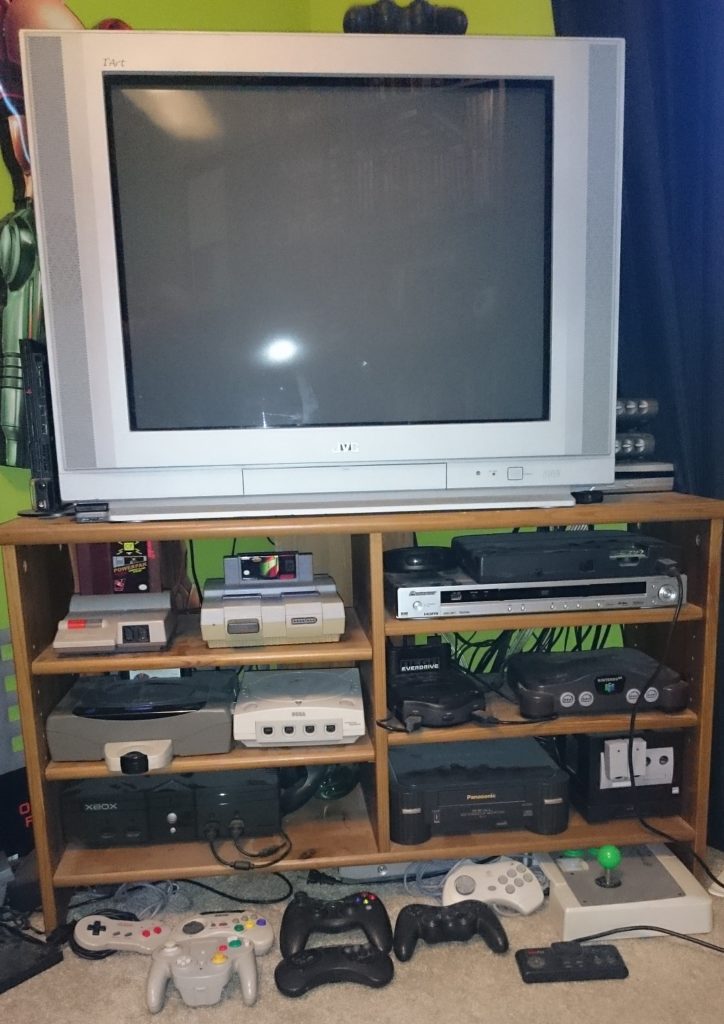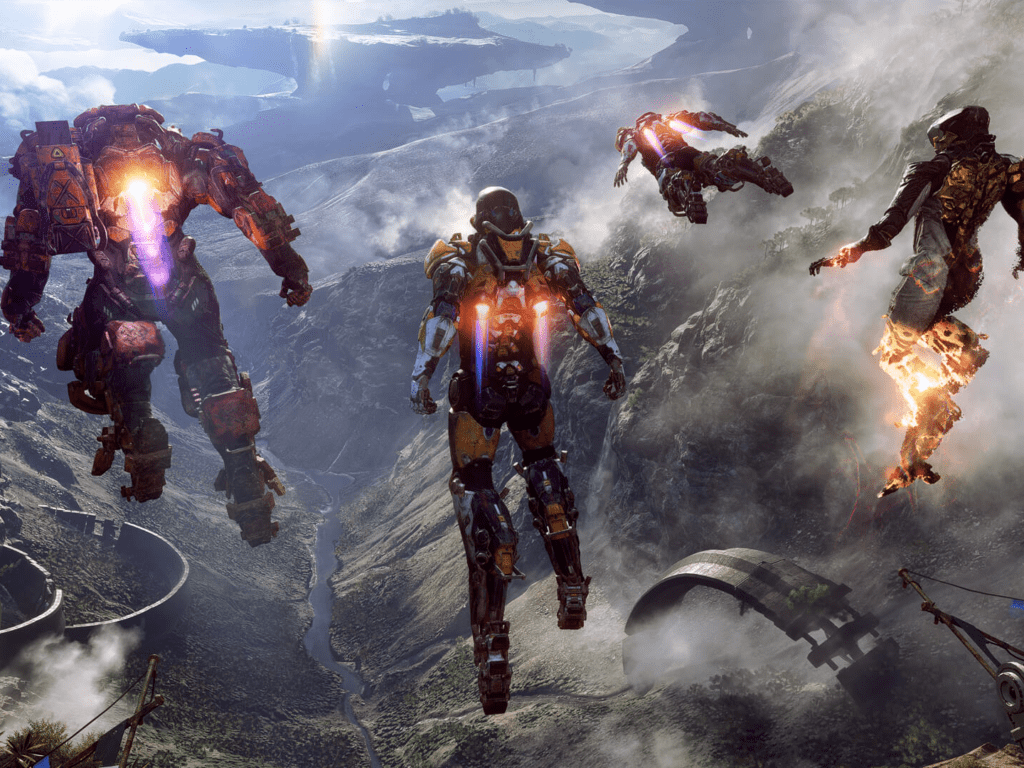 E3 week has rolled around yet again and that can mean only one thing: It’s the perfect time to look at your backlog!
E3 week has rolled around yet again and that can mean only one thing: It’s the perfect time to look at your backlog!
Wait, what? But Days Gone is coming and there’s Anthem from Bioware and Destiny 2 and Super Mario Odyssey and The Last Night looks fantastic and and and ad nauseam! This isn’t when you want to look at old games! Or is it? The average gamer has more games than they have time to play these days. On top of that, the industry has normalized the idea of preordering games up to several years in advance just to get your foot in the door when they come out, even though virtually no preordered titles get under-printed. So with E3 just getting underway, I thought I’d take a look at all the things I still haven’t played yet…and that’s a lot.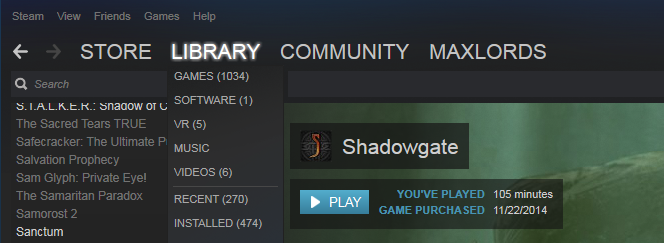
I’ve been collecting since the mid-nineties, ever since I sold my copy of Final Fantasy III for the SNES, decided I wanted to play it again, and then couldn’t find a copy for months. Ever since then, if I buy a game, I keep it until I play it and decide if I like it. But in the 90s, games came out much more slowly. By the time you’d rented the game (yes, you could rent games at a corner mini-mart or video store back then), played it to death, and moved on to something else, the next game you were waiting for still wasn’t out. That simply isn’t the case anymore. There are so many games out and coming out that it’s hard to even keep track of what might be interesting, let alone everything that’s been released. And that’s why backlogs are such a problem. There are more good games coming out than most people have time to even try, much less play through. Most people simply buy what looks good, get sidetracked, and end up with a bunch of things they don’t even have time to open. It’s a ridiculous consumer feedback loop that doesn’t benefit anyone but game companies and retail stores.
For example, I still have Super Nintendo games that I haven’t gotten around to playing yet. I bought them in the nineties! It’s a habit that becomes a compulsion; the fear of missing out on the next Suikoden II or Shantae or Panzer Dragoon Saga. What if you don’t buy it and when you go to get it, you can’t afford it anymore? But will you ever play it? Do you even have the time? Assuming you work a 40 hour work week or go to school full time, you likely have limited time for gaming. Add a commute, a relationship, or even a child to that equation and you have even less. You might get three to five hours of game time in a week. The average game takes around 20 hours to complete. That’s ten weeks to finish one game, assuming you don’t play anything else or get bored of it. You might be able to finish five games a year at that rate. Round it up to ten for people with summers off or extra free time. But even at ten games a year, you aren’t remotely scratching the surface of what comes out in any given year, and that’s just looking at mainstream titles! If you have PlayStation Plus or Xbox Live Gold, you get four to six games free every month on top of what you purchase. If you have Steam, GOG (Good Old Games), Origin, or uPlay, you might get another 5-10 games free a year if you pay close attention online. That’s well over a hundred games excluding retail purchases if you use all of those services. At an average of 20 hours each, you’re looking at roughly over 2000 hours of gameplay, and following our formula that says we have five hours a week, that backlog becomes 7.7 years of gameplay.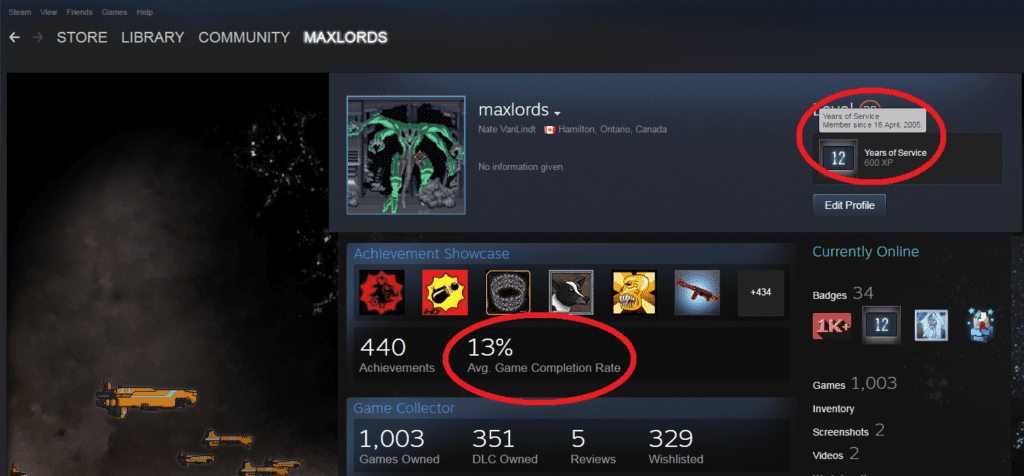
Over seven years of gameplay just in random titles from online services. Then we add in the AAA titles that most people buy and tend to play more heavily and the average serious gamer has a backlog of up to ten times what they could realistically play at any given time. A quick look at my collection made me nearly nauseous when I used this formula. On Steam alone, I have 1003 games, many of which I have never even installed. For the PS2? 128. The DS? 101. The PS1? 72 games. That’s over 1300 games and doesn’t include about two-thirds of my collection. And don’t forget about flash carts. I have access to every single US and Japanese game for the NES, Genesis, Turbografx 16, and DS. Thousands of titles. My Steam library averages out to about 77 years of backlog. Statistically, I will literally die before I can possibly play every game on my Steam account to completion. An actual, honest-to-goodness lifetime of gaming is at my fingertips at any given moment. And yet I still I buy games all the time, but I literally cannot play them. I’ve talked to other gamers that have backlogs on Steam of up to 3000 games. It’s almost a status symbol for them.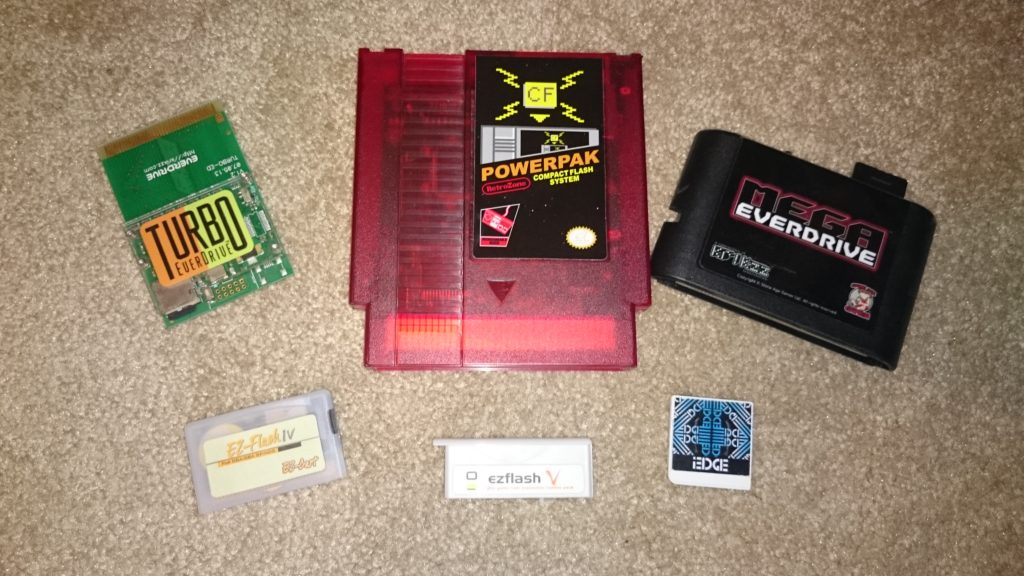
We don’t need this much media. But as we buy more and more, faster and faster, we show developers that they don’t need to take their time or fully playtest a game for us to buy it. Half the time, we stick it on a shelf and don’t get to it for six months. Or a year. Or five. Or even ten. The situation has degraded so much that there are even sites like www.backloggery.com that allow you to track not only your collection but your completion rate as well. Steam does this for you automatically, and it can be rather disheartening to see right there in black and white. I’ve been a Steam member for 12 years and I’ve only managed a 13% completion rate. However, even that is inaccurate because that number is calculated on the achievements you’ve earned, not the games you have finished. I wouldn’t hesitate to say that most people don’t end up finishing the games they start these days due to the nature and volume of the market, and it almost doesn’t matter that the developers haven’t properly programmed and playtested those games.
So what does all this mean? To me, it means the market is utterly flooded; inundated with content ranging from indie games to AAA titles to the point where it’s hopelessly diluted and difficult to have a pure gaming experience. Very few games end up being memorable and at the same time, we’ve created a sub-culture where people brag about all the items they own but never actually use them. There are too many games and we can’t play most of them. A lot of the most highly advertised titles end up being terrible too, due to compromises made to appeal to wider audiences. Reviews are bought and sold like commodities and it’s very difficult to judge for yourself what might be good. E3 is the perfect example of this, creating massive hype for titles that test well with audiences and critics, overproduced shows of products that won’t be coming out for some time, and generally driving a multi-billion dollar ad campaign that sucks dollars out of the pockets of hard-working people. As I write this, Xbox has wrapped up their E3 presentations and already most of the bigger titles are available to preorder on Amazon, even though the release dates are as far away as next fall or later. Money is flying into the pockets of companies as we speak for nothing more than a promise of things to come drifting on the wind.
Gamers need to stop and think about how excited they were for the items that are already sitting on their shelves when they were announced. We can’t let that feeling of wonder end the second we get the actual product. If we all stop to play what we already have, perhaps it will make the industry also reconsider the type of games it is releasing and the volume it is releasing them in. Having a backlog says a lot about a person, but it also speaks volumes to the way marketing and consumer culture affect us as individuals. That’s a message many of us need to heed more often. So take a look at your shelf. Make an effort to try that game you’ve always been meaning to but were never in the mood for. You might just recapture the magic in gaming by popping in a hidden gem. And you might find that the entertainment you’ve been scouring the net looking for is something you already had the whole time.
A Contest And An Addendum
In writing the above article and looking at my backlog, I also realized that in addition to a ridiculously large backlog, I also have a ridiculous number of games sitting about unused on my Steam account and other digital accounts. These are extras I’ve gotten to give as friends, freebies that came with purchases, and just random extra codes I’ve acquired over the years. I thought to myself, “What better use could I have for all these games than to give them away to people who will play them?” And so, The Great Real Otaku Gamer Steam Backlog Contest was born!
For those of you that are interested and want to put in a minimal amount of effort, I’m going to give away my extra Steam codes! But the rules for winning are something a bit different. The winners for this contest will be the entrants with the smallest uncompleted backlogs! After all, in this day and age with everyone oversaturating themselves with media, maybe the person who actually finishes what they start deserves a reward! So please take a moment and head on over to The Great Real Otaku Gamer Steam Backlog Contest right here on Real Otaku Gamer and drop an entry my way! You might just win a new game to play…and it might even be good!


